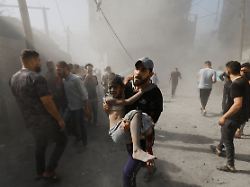No place is safe
Fear of death is a constant companion in the Gaza Strip
October 26, 2023, 12:09 p.m
Since the Hamas attack, Israel has repeatedly bombed the Gaza Strip. Around a million Palestinians are waiting in emergency shelters in the south of the coastal enclave. They’re not safe there either. The suffering could also worsen.
If the bombing stops for a while, the streets in the south of the Gaza Strip will fill up. People use the moment to get things done. Long queues form in front of water tanks, as well as in front of bakeries. But it’s not always worth the wait. Because bread and many other foods are in short supply. In the markets, greengrocers often only sell – at high prices – shriveled tomatoes, cucumbers and eggplants. Before the war, a lot of vegetables came from Israel, local residents say. But those times are over.
Many people in the largely isolated coastal area are dependent on help. So did Siham Abu Ghalijun. The Palestinian woman and her five children are staying in an area designated as a “humanitarian zone” called Al-Mawasi in the south of the Gaza Strip. The family lives here in a tent camp. At the beginning, water and food were scarce, says the 41-year-old. In the meantime, however, the food supply has improved. Since the brutal terrorist attack on Israel on October 7th on behalf of Hamas, which rules in the Gaza Strip, in which hundreds of people fell victim, Israel’s army has been bombing targets in the coastal enclave in series. Thousands of deaths are now being reported there too, although the information cannot be independently verified.
Israel allows aid deliveries
Initially, Israel did not allow aid supplies into the densely populated Palestinian area for two weeks. The first deliveries of drinking water, food and medicine were only allowed to cross the border on Saturday. Since then, dozens of trucks have arrived. According to the United Nations, more than 100 truckloads of food are needed every day to supply the 2.2 million people in the Gaza Strip.
In addition to the difficult supply situation, people are also worried about other things, especially fear of death. “We are afraid of being exposed to bomb attacks here,” says Abu Ghalijun in the “humanitarian zone” in Al-Mawasi. Nearby impacts repeatedly caused panic in the camp. The mother of five then hugs her children every time, as she says.
The sounds of explosions are frightening, especially at night. The suffering could worsen again if Israel launches an expected ground offensive. Bloody street fights, human shields, hidden explosive devices – experience shows that warfare between tightly packed city blocks can quickly increase the number of victims. Around a million people have now evacuated their homes on the instructions of the Israeli army and have been forced to leave behind a large part of their belongings in the north of the Gaza Strip. In the south, where, according to Israeli military reports, Hamas targets are also being attacked despite calls to evacuate, many internally displaced people are waiting in densely packed emergency shelters.
Not everyone wants to flee
Many people in a small space increase the risk: the armed forces say they always try to spare civilians during their air strikes – but according to reports from the Gaza Strip, this is far from always successful. According to Israel’s military, misguided rockets from militant Palestinians occasionally hit there – instead of in Israel as planned. In the Gaza Strip, there are increasing reports of people who fled to the south and then died there in bomb attacks or under the rubble of their emergency shelters that had been reduced to rubble.
That’s why Sumanja Shahin doesn’t want to flee herself. The 48-year-old lives with several relatives in a house in the north of the coastal enclave. The group of around 40 people currently live primarily on supplies; there is no water or electricity in their home. There are constant bombardments in their area and the situation is very dangerous. She is especially afraid at night. But Sumanja Shahin still doesn’t want to go. “Our life is here – and so is our death.”
